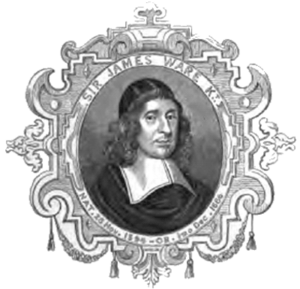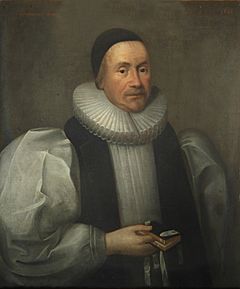James Ware (historian) facts for kids
Quick facts for kids
Sir
James Ware
|
|
|---|---|
 |
|
| Member of Parliament for Dublin University |
|
| In office 1661 - 1666 – 1634 - 1641 |
|
| Privy Council of Ireland | |
| In office 1660–1666 |
|
| Auditor General | |
| In office 1660–1666 |
|
| Personal details | |
| Born | 26 November 1594 Dublin, Ireland |
| Died | 1 December 1666 (aged 72) Dublin, Ireland |
| Resting place | St Werburgh's Church, Dublin |
| Spouse | Elizabeth Newman |
| Parents |
|
| Education | Trinity College Dublin |
| Known for | historian |
Sir James Ware (born 26 November 1594 – died 1 December 1666) was an important historian from Ireland. He spent his life studying and writing about Irish history, collecting many old manuscripts. He also held important government jobs, serving the King and helping to manage Ireland's finances.
Contents
Early Life and Family
James Ware was born in Dublin, Ireland, on November 26, 1594. He was the oldest son of Sir James Ware and Mary Bryden. His father was also an important person who came to Ireland in 1588. He worked for the Lord Deputy of Ireland, who was like the King's main representative.
In 1620, James Ware married Elizabeth Newman. They had ten children together. However, only two of their sons, James and Robert, lived longer than their father.
Becoming a Historian and Public Servant
James Ware started studying at Trinity College Dublin in October 1611. There, he became very interested in Irish history. He began collecting old Irish manuscripts, which are handwritten documents. He also copied works from other collections, including those of his good friend, James Ussher. Ussher was a very important religious leader in Ireland at the time.

In the early 1620s, James helped his father with a big government review. This review looked at how things were going in Ireland. His work impressed powerful people, like Richard Boyle, 1st Earl of Cork, who hired James to research his family history.
Because of his good work, in 1629, James Ware was asked to go to London to talk to King Charles I. They discussed money problems facing the Irish government. This visit was a success! As a reward, King Charles I made him a knight in 1630. When his father passed away in 1632, James took over his job as Auditor General. This meant he was in charge of checking the government's money.
Political Roles and Challenges
James Ware's career continued to grow. He was elected as a Member of Parliament for Dublin University in 1634. This meant he helped make laws for Ireland. He also traveled with the Lord Deputy to different parts of Ireland. He used his knowledge of old Irish writings to help the government prove its claims to land.
In 1638, he got a special deal with another official. They were given the only right to give out licenses for selling drinks like ale and brandy. This was a very profitable deal, likely a reward for his hard work in making the government more efficient.
James Ware was one of the few government officials that the Lord Deputy, Sir Thomas Wentworth, 1st Earl of Strafford, respected. In 1640, he became a member of the Irish Privy Council. This was a group of important advisors to the King in Ireland. He was also re-elected to the Irish Parliament. Even when Wentworth faced serious problems and was later executed, James Ware managed to avoid trouble. He was very loyal to the King's interests in Ireland.
During the Wars and Exile
James Ware remained loyal to the King during the Irish Confederate Wars. These were big conflicts that affected Ireland and Britain in the 1640s. He strongly supported James Butler, 1st Duke of Ormonde, another important figure loyal to the King.
In 1644, James was sent to Oxford to tell King Charles I about what was happening in Ireland. While there, he studied at the Bodleian Library and received a special degree from the University of Oxford for his excellent scholarly work.
On his way back to Ireland in 1646, he was captured by forces loyal to the Parliament (not the King). He was held in the Tower of London for several months. After he was released, he returned to Dublin. However, when Dublin was taken over by Parliament's forces in 1647, James Ware was sent to England as a hostage.
In 1649, he was forced to leave Ireland because he supported the King. He lived in France for a while. In 1650, he was allowed to move to London, thanks to his friend James Ussher. He had to promise not to get involved in politics. During this time in London, he focused on his historical research. He became friends with many leading historians and experts on old things in England.
Return to Public Life and Final Years
When the King returned to power in 1660 (this was called the Stuart Restoration), James Ware got his job back as Auditor General. He was also re-elected as a Member of Parliament for Dublin University. He continued to be an active member of the Privy Council.
Even more importantly, he was chosen to be one of the people in charge of settling land disputes in Ireland. This was a very good position and a reward for his strong loyalty to the King during the difficult 1640s. He remained close friends with the Duke of Ormonde, who often visited him for advice.
Sir James Ware passed away at his home in Dublin on December 1, 1666, at the age of 72. He was buried in St Werburgh's Church, Dublin. Even two hundred years later, people still remembered him as a very reliable and important writer of Irish history.
His Lasting Impact
Sir James Ware left behind many valuable handwritten documents and research. However, his son, Robert Ware, who also loved history, added some fake writings to his father's blank pages. Robert used his father's good name to make his own false stories seem real. These fake writings caused problems for Irish church history for over 300 years. They made it seem like Sir James Ware had written things he hadn't, especially about religious topics. The forgeries were only discovered much later, in the late 1800s.
Robert wasn't the only one who changed Sir James Ware's work. Walter Harris, who married Robert's granddaughter, also used Ware's writings to support his own anti-Catholic views. Harris translated Ware's works in 1739. He changed the text to make it seem like Ware was proving a long history for the Protestant Church in Ireland, even though Ware's original work was much more neutral.
In 1686, Robert sold his father's manuscripts to Henry Hyde, 2nd Earl of Clarendon. Later, these manuscripts were passed on to James Brydges, 1st Duke of Chandos. Many important people, like Archbishop William King and the famous writer Jonathan Swift, tried to buy Ware's valuable collection, but they were not successful.
Even though the collection was later sold and spread out, a large part of Sir James Ware's important manuscripts were saved. Many were bought by Richard Rawlinson and are now kept in the Bodleian Library. Another big collection was given to the British Museum (now the British Library). Thanks to these efforts, much of Sir James Ware's incredible historical work is still available for us to study today.
Images for kids
 | Jessica Watkins |
 | Robert Henry Lawrence Jr. |
 | Mae Jemison |
 | Sian Proctor |
 | Guion Bluford |


